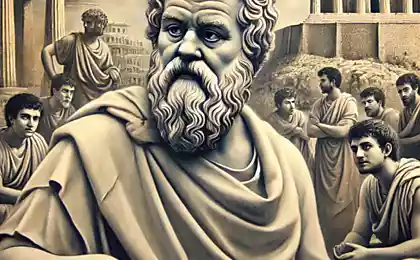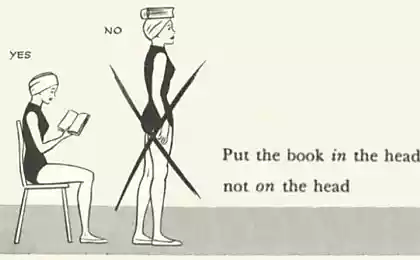270
5 well-known and misunderstood philosophical quotes

A historical journey through time-distorted meanings
Philosophical quotations often become part of everyday speech, but their true meaning is often lost or distorted. Phrases taken out of context can take on a completely different meaning than what the author put in. For an accurate understanding of philosophical ideas formulated several centuries ago, it is necessary to immerse yourself in the historical context and familiarize yourself with the full works of thinkers.
In this article, we will look at five well-known philosophical statements that are usually misunderstood. Having studied their original context and the original intent of the authors, we will see how modern interpretations can differ from the original ideas. This intellectual journey will not only enrich your knowledge, but also serve as a lesson in critical thinking in an era of information noise.
1. “God is Dead” by Friedrich Nietzsche
"God is dead!" God will not rise again! And we killed him! How can we comfort ourselves, killers of murderers! ?
It's usually understood
Many perceive this phrase as a direct denial of the existence of God, a manifesto of militant atheism, or even a call for anti-religious action. The quote is often used to illustrate a radical atheistic worldview and nihilism.
The true context
This phrase appears in The Merry Science (1882) and develops in other works of Nietzsche. The philosopher did not make a simple statement about atheism. He diagnosed the deep cultural crisis of Western civilization in the late nineteenth century, when traditional religious values lost their strength under the onslaught of rationalism, science and secularization.
Nietzsche warned of the dangerous consequences of this process: the disappearance of the moral foundation of society, the loss of the meaning of existence and a value vacuum. The “death of God” is a cultural disaster that requires the creation of new values, not a cause for joy. He foresaw that the loss of the religious basis of morality could lead to nihilism and existential crisis.
How to Apply the Right Understanding
- Study the full text of works, not individual quotes
- Consider the historical and cultural context of philosophical works
- Analyze the author’s general philosophical system, not fragments torn.
- Ask yourself, “What problem was the philosopher trying to solve?”
2. “Man to Wolf” by Thomas Hobbes
Homo homini lupus est (Wolf to Man)
It's usually understood
This Latin phrase, often attributed to Thomas Hobbes, is commonly interpreted as a statement of the inevitable aggressiveness and cruelty of human nature. Many believe that Hobbes saw humans as exceptionally selfish and violent beings, incapable of altruism and cooperation without external coercion.

The Dualism of Human Nature in Hobbes Philosophy
The true context
First of all, it is worth noting that the original phrase "Homo homini lupus est" belongs to the Roman comediographer Plautus (III-II centuries BC), not Hobbes. Hobbes did use this expression in the dedication to his work On the Citizen (1642), but with an important addition.
Hobbes once said, “Man is a wolf to man, but man is a god to man.” With this opposition, the philosopher emphasized the dualism of human nature. In the state of nature, people are indeed prone to selfishness and conflict, but through the creation of a social contract and state, they can overcome these destructive tendencies.
The main idea of Hobbes was not to assert the constant malice of man, but the need for social construction – the creation of social institutions that will help overcome the negative aspects of human nature and realize the positive. He saw the state as a necessary tool to contain destructive impulses and create conditions for peaceful coexistence.
Practical conclusions
- Check the source and authorship of philosophical statements
- Look for full versions of quotes, not limited to brief wording
- Consider that many philosophers have looked at problems in a complex way, avoiding unambiguous assessments.
- Apply the principle of benevolence in interpretation: assume that the author had a rational basis for his ideas.
3. “The end justifies the means” – Niccolo Machiavelli
Il fine giustifica i mezzi (The end justifies the means)
It's usually understood
The phrase “the end justifies the means” is strongly associated with Machiavelli and is perceived as a call for immoral actions to achieve political goals. Many believe that the Italian Renaissance thinker promoted unscrupulousness and cynical manipulation of people to hold onto power.
The true context
Amazing fact: Machiavelli never wrote the phrase “the end justifies the means” in this formulation. This statement attributed to him is a simplified interpretation of some of his ideas from the treatise The Prince (1513). In fact, his position was much more nuanced.
Machiavelli lived in an era of political chaos in Italy, fragmented into warring city-states, and sought ways to achieve stability and unity. In The Sovereign, he analyzed the methods by which rulers can achieve political stability and protect the state from external and internal threats.
Instead of immoral cynicism, Machiavelli proposed political realism—an objective view of the mechanisms of power without idealization. He acknowledged that sometimes rulers have to make tough decisions to protect the common good, but did not argue that any means are justified. Moreover, in his Discourse on the First Decade of Titus Livy, he emphasized the importance of republican virtues and the moral conduct of citizens.
How to Avoid Misinterpretations
- Read the primary sources, not just comments.
- Consider the historical circumstances of the creation of philosophical works.
- Compare different works of the same author to get a complete picture of his views
- Remember that many philosophers have written for specific audiences and for specific practical purposes.
4. “I think, therefore I am.” – René Descartes
Cogito, ergo sum (I think, therefore I am)
It's usually understood
The famous Cartesian principle is often interpreted as a simple logical conclusion, or even as a definition of a person through his thinking abilities. Some see this phrase as an assertion of the superiority of reason over other aspects of human existence, or even a justification for anthropocentrism.

Visualization of Methodical Doubt by Descartes
The true context
Descartes formulated his famous principle in the context of the search for absolutely reliable knowledge. In his Discourse on Method (1637) and Reflections on First Philosophy (1641) he employed the method of radical doubt, consistently rejecting everything that could be questioned.
“Cogito, ergo sum” was not for Descartes a logical syllogism or a definition of man. It was the discovery of the only indisputable fact in the process of total doubt. Even if we assume that some “evil genius” is misleading us about the whole perceived world, the act of doubt proves the existence of the doubter.
This principle was for Descartes the methodological foundation, the Archimedean point of support, on which he built his entire philosophical system. Beginning with the undeniable fact of the existence of a thinking subject, he tried to restore reliable knowledge of the world, God and human nature.
Practical application of correct understanding
- Use methodological doubt as a critical thinking tool
- Look for reliable foundations of your beliefs and knowledge systems
- Remember that some truths can be obvious directly, without a logical conclusion.
- Distinguish different types of certainty: logical, empirical, intuitive
5. “What doesn’t kill me makes me stronger” – Friedrich Nietzsche
"Was mich nicht umbringt, macht mich stärker"
It's usually understood
This phrase from Twilight of Idols (1888) became a popular motivational slogan. It is often interpreted as the universal truth that all difficulties and suffering inevitably temper character and make a person stronger. Such an understanding can lead to romanticization of suffering and underestimation of the ravages of traumatic experiences.
The true context
Nietzsche wrote this phrase in the context of his concept of reevaluating all values and philosophy of life as the will to power. For him, “strength” was not limited to physical endurance or psychological resilience – it included the ability to assert life, creatively transform experiences, and create one’s own values.
It is important to understand that Nietzsche did not consider all suffering useful. He distinguished between suffering that destroys and debilitates and overcoming that transforms. This quotation should also be seen in the context of the concept of “amor fati” (love of fate) – affirming all one’s experience, including painful moments, as a necessary part of life.
Nietzsche himself suffered from severe illnesses for most of his life, and his statement can be interpreted as a personal strategy for giving meaning to his suffering. The universalization of this principle contradicts other aspects of Nietzsche’s philosophy, especially his critique of absolute truths and universal precepts.
Current application
- Don’t romanticize suffering – not all traumatic experiences make us stronger.
- Develop the ability to comprehend and integrate complex experiences
- Recognize that resilience is a skill that can be developed
- Use philosophical ideas critically, adapting them to your context.
- Refer to psychological research on post-traumatic growth for a science-based understanding of transformation through overcoming challenges
Conclusion: How to avoid distorting philosophical ideas
These examples show how deeply the meaning of philosophical statements can be distorted when they are removed from the historical and textual context. Popular interpretations often simplify complex ideas to catchy slogans, losing the nuances of the original thought.
For an accurate understanding of philosophical concepts, it is recommended to follow several principles:
- Refer to primary sources and read the full texts of works
- Study the biographies of philosophers and the historical circumstances of the creation of their works
- Analyze the evolution of the author’s ideas throughout his work
- Discover different interpretations and critical comments
- Apply the principle of contextualization, placing statements in the framework of specific discussions of their time
Glossary of terms
An existential crisis
A state of anxiety that arises when confronted with questions about the meaning of existence, freedom of choice and responsibility. It is characterized by a sense of meaninglessness, alienation and loss of value orientations.
Social construction
The process of creating social institutions, norms and practices through collective human interaction. Many aspects of social reality are not natural or inevitable, but are shaped by human activities and agreements.
Political realism
An approach to the analysis of political relations based on the recognition of conflicts of interest, force factors and practical necessity, as opposed to idealistic or moralistic approaches. It involves studying politics as it is, not as it should ideally be.
Archimedes' foothold
A metaphor based on Archimedes’ statement about the possibility of turning the Earth over with a point of support. In philosophy, it means a fundamental principle or undeniable truth on which to build a system of knowledge.
Reevaluation of all values
Nietzsche's philosophical project aimed at a critical revision of the traditional moral, religious and metaphysical values of Western culture. It involves the rejection of absolute truths and the creation of new life-affirming values based on the will to power.
Methodological doubt
The philosophical method developed by Descartes, which involves the systematic questioning of all judgments and beliefs in order to reveal undoubted, absolutely certain truths. It is used as an epistemological tool to combat prejudice and unfounded opinions.
Resilience
Psychological ability to withstand stressful situations, adapt to adverse conditions and recover from traumatic events. Includes cognitive, emotional and social skills to help constructively cope with difficulties.
10 Signs That You Are In Love With An Ambitious Woman, And How To Build A Relationship With Her
9 Reasons Why You Can't Get Rid of Your Complexes























